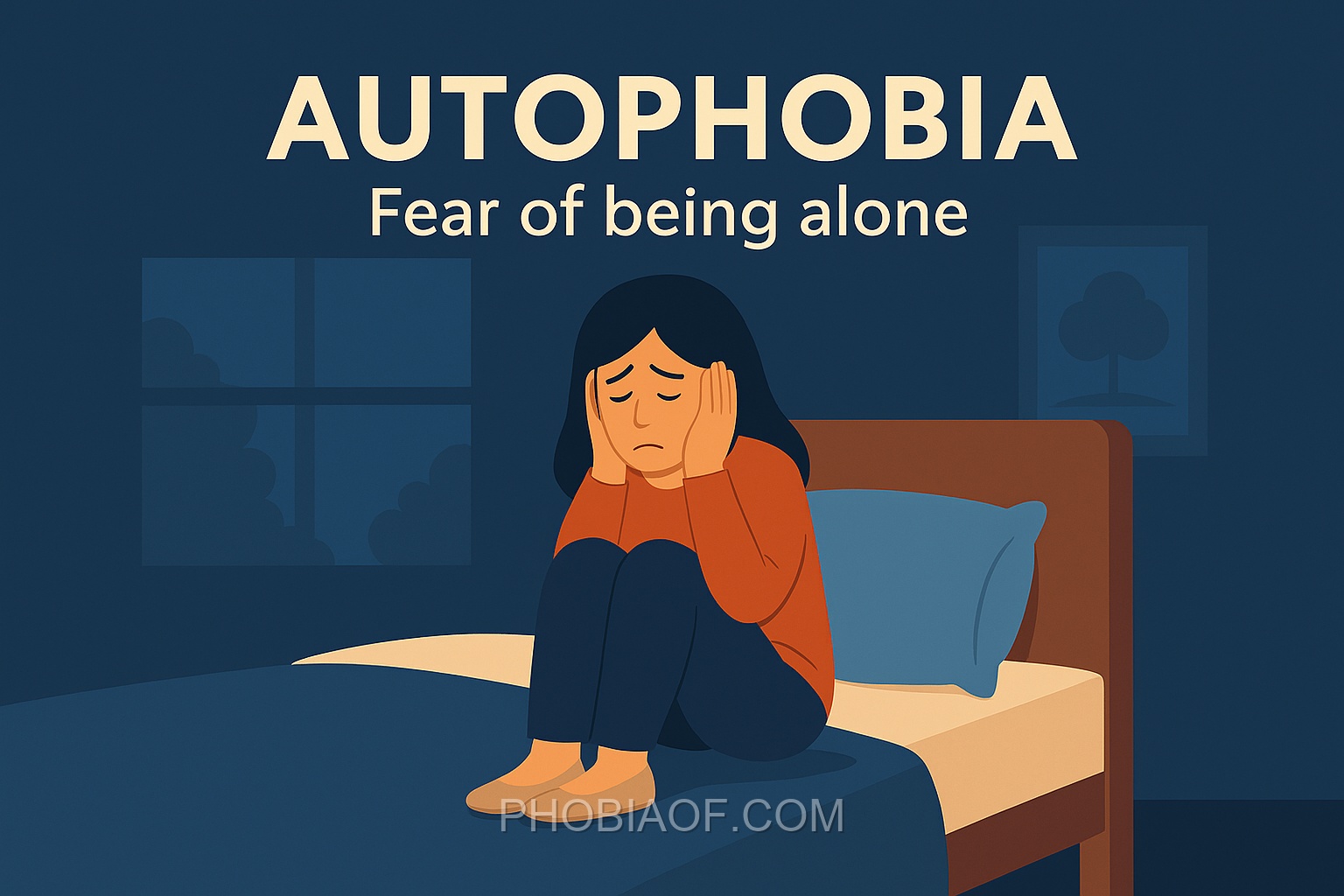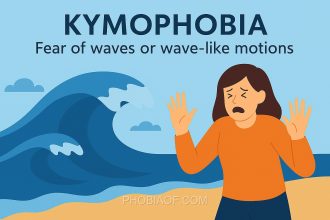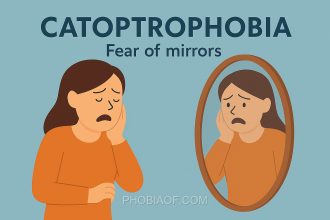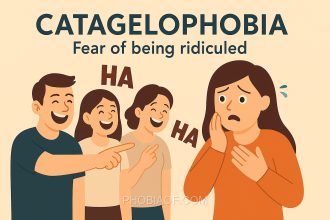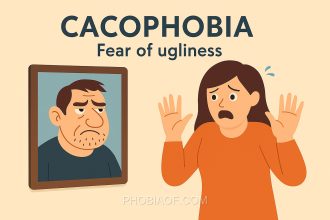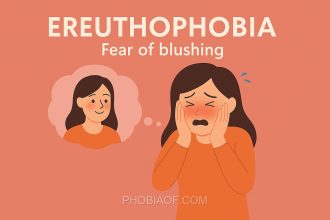Have you ever felt uneasy when left alone, even in the comfort of your own home? This unsettling feeling can be more than just a fleeting discomfort for some; it is known as Autophobia, or the fear of being alone. This fear can be overwhelming and persists even in safe environments.
Autophobia comes from the Greek words “autos,” meaning self, and “phobos,” meaning fear. It describes a condition where the individual experiences intense anxiety about solitude or perceived isolation, regardless of whether they are physically alone or not.
People with Autophobia often face challenges that go beyond a simple dislike of solitude. Generally, this phobia can affect individuals in several ways:
- They may experience panic attacks or anxiety when they anticipate being alone.
- Everyday activities like staying in a room without company or sleeping alone can become daunting tasks.
- It can lead to dependency on others for constant reassurance and companionship, affecting personal relationships and self-esteem.
Understanding Autophobia is crucial as it affects a person’s mental health and daily life. Compassionate support and professional guidance can help those struggling with this phobia to manage their fears and regain a sense of independence and peace.
Causes of Autophobia
Autophobia, or the fear of being alone, can develop due to several factors. Understanding these causes can help in managing and treating this phobia effectively. Here are some common reasons why someone might develop autophobia:
- Genetic Predisposition:
Some individuals may have a genetic predisposition to anxiety disorders, including specific phobias like autophobia. If a person has family members with anxiety issues, they might be at a higher risk of developing similar conditions.
- Traumatic Experiences:
Experiencing traumatic events, especially during childhood, can lead to the development of autophobia. Events such as being left alone for extended periods or experiencing abandonment can trigger this fear.
- Learned Behavior:
Autophobia can also be a learned behavior. If someone grows up in an environment where others exhibit a fear of being alone, they might adopt this fear themselves. Observing anxious behaviors in others can reinforce similar patterns in an individual.
- Psychological and Environmental Factors:
Various psychological conditions, such as depression or generalized anxiety disorder, can contribute to the development of autophobia. Additionally, environmental factors like high stress, significant life changes, or lack of social support can exacerbate this fear.
Moreover, interesting theories suggest that autophobia might be linked to evolutionary survival instincts. Being alone in prehistoric times could have increased vulnerability to threats, which might explain why some people have a heightened fear of solitude.
Symptoms of Autophobia
Autophobia, also known as monophobia, is characterized by an intense fear or anxiety about being alone or feeling isolated. This fear can be overwhelming and interfere with daily activities. Those experiencing autophobia may notice a variety of physical and emotional symptoms, which can manifest in several ways:
- Panic Attacks: Sudden and intense episodes of fear that may include symptoms such as chest pain, dizziness, and a sense of impending doom.
- Sweating: Excessive perspiration, particularly when faced with the prospect of being alone.
- Rapid Heartbeat: An accelerated heart rate that occurs in response to the fear of isolation.
- Trembling or Shaking: Uncontrollable shakes or tremors due to heightened anxiety levels.
- Shortness of Breath: Difficulty breathing or a feeling of being suffocated when alone.
- Avoidance of Triggers: Deliberately avoiding situations or places where the person might be left alone.
- Overwhelming Dread: A persistent sense of fear or dread about the possibility of being alone.
- Emotional Distress: Feelings of helplessness or despair when facing solitude.
- Dependence on Others: A strong reliance on the presence of others to feel safe and secure.
- Restlessness: An inability to relax or feel calm when alone, often leading to pacing or other nervous habits.
If autophobia becomes severe, these symptoms can significantly interfere with daily life, making it challenging to engage in normal activities or maintain healthy relationships.
Treatment for Fear of Being Alone
Feeling fear when alone, known as autophobia, is a challenge many people face. The good news is that this phobia can be effectively treated and managed over time with the right approach. If you’re struggling with autophobia, remember that you are not alone and that various treatment options and coping strategies can help you overcome this fear.
Proven Therapies
Several therapies have been found to be particularly effective in treating autophobia:
- Exposure Therapy: This therapy involves gradually facing your fear in a controlled and safe environment. By slowly increasing your exposure to being alone, you can reduce your fear response over time and build confidence in handling situations that trigger your anxiety.
- Cognitive-Behavioral Therapy (CBT): CBT is a widely used approach that helps you identify and change negative thought patterns that contribute to your fear. Through CBT, you can learn to replace fearful thoughts with more positive and realistic ones, reducing anxiety and improving your overall mindset.
- Counseling: Talking to a professional counselor can provide support and guidance as you work through your fear of being alone. Counseling offers a safe space to explore your feelings and develop coping strategies tailored to your needs.
Self-Help Coping Techniques
In addition to professional therapy, several self-help techniques can complement your treatment:
- Relaxation Exercises: Techniques such as deep breathing, progressive muscle relaxation, or guided imagery can help calm your mind and reduce anxiety when you find yourself alone.
- Meditation: Regular meditation practice can improve your ability to manage stress and remain present, reducing the impact of fear when you’re alone.
- Support Groups: Joining a support group allows you to connect with others who understand your experience, providing encouragement and sharing coping strategies.
Medication
In severe cases, medication such as anti-anxiety medications might be considered to help manage symptoms. However, it’s important to focus on therapy and coping skills as the primary means of overcoming autophobia.
Seek Professional Help
If your fear of being alone is interfering with your daily life, it is crucial to seek professional help. A mental health professional can provide a personalized treatment plan and guide you on your journey to overcoming autophobia. Remember, with time and effort, you can conquer your fear and lead a fulfilling life.
Conclusion
Understanding the causes and symptoms of autophobia is a crucial step in empowering oneself to address this often debilitating fear. By recognizing the underlying triggers and acknowledging the emotional and physical manifestations, individuals can begin to take meaningful steps toward managing their phobia. This awareness allows for more informed decisions about seeking help and exploring coping strategies.
It is important to remember that overcoming or managing autophobia is a journey that many people successfully navigate with time and the right support. Whether through therapy, self-help strategies, or medical advice, each step taken is a step toward reclaiming control and reducing the fear of being alone. As with many mental health challenges, progress may be gradual, but it is indeed achievable.
For those finding it difficult to cope, seeking professional support can be incredibly beneficial. Consider reaching out to a therapist or talking to a doctor to explore the options available for managing autophobia. With perseverance and the proper support, living a more comfortable and fulfilling life is entirely possible.
Remember, you are not alone in this journey. Many have faced similar fears and have found ways to thrive. Take the first step today, and embrace the possibility of change and healing.
